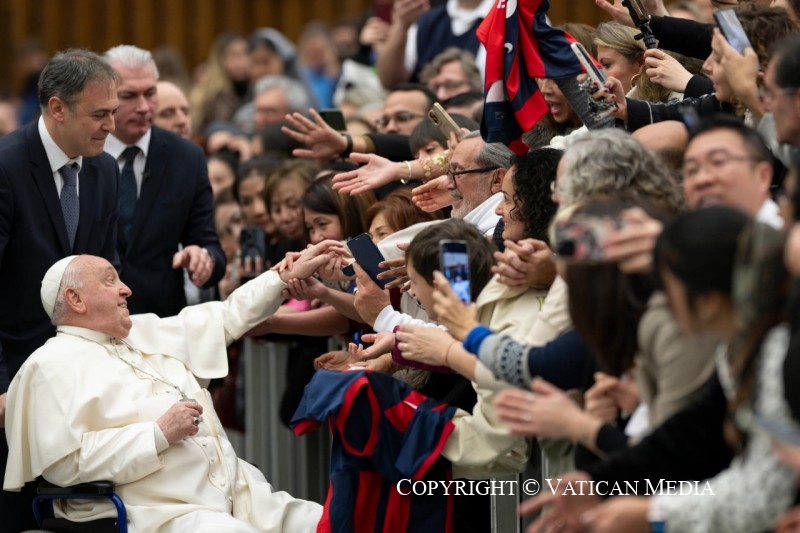Leo XIV: 'our fragility is a bridge towards heaven'
During today’s general audience in St Peter's Square, the pope delivered the catechesis on the final moments in the earthly life of Jesus, whose thirst is that of humanity: a "profound desire" for love. Salvation lies "in the art of asking without shame and offering without ulterior motives”. Leo also offered a prayer for the people of Sudan, devastated by war, famine, and now a devastating landslide that caused countless deaths.
Vatican City (AsiaNews) – Pope Leo XIV today continued the series of catechises for the Jubilee dedicated to "Jesus Christ our hope" at the Wednesday general audience in St Peter's Square.
In his address, the pontiff stressed that a joy is born “In fraternity, in the simple life, in the art of asking without shame and offering without ulterior motives,” adding that “our fragility is a bridge towards heaven.”
The focus of today's commentary was the Gospel of John, which refers to the “the most luminous and at the same time darkest moment of Jesus’ life”, namely the Passion.
“[I]n Christ’s thirst we can recognize all of our own thirst. And to learn that there is nothing more human, nothing more divine, than being able to say: I need,” Leo said. thus, “Let us not be afraid to ask, especially when it seems to us that we do not deserve [it]. Let us not be ashamed to reach out our hand. It is right there, in that humble gesture, that salvation hides.”
The Holy Father explained that in the pages that narrate the end of Jesus' earthly life, the evangelist delivers some remarks that hold an "immense mystery", namely “I thirst" (19:28) and "It is finished" (19:30).
On the cross, Jesus is a “supplicant for love”. He does not proclaim, condemn or defend himself. He humbly asks for what he, alone, cannot give to himself in any way,” the pontiff said. His thirst, and that of all of us, is not only a physiological need, but expresses “a profound desire: that of love, of relationship, of communion.”
For love to be "true" we must “learn to ask," not just "to give." Thus, even God "is not ashamed to beg for a sip," Leo XIV added. He manifests all his humanity, which is the same as that of every person.
“No-one can save themselves. Life is ‘fulfilled’ not when we are strong, but when we learn how to receive.” In fact, only when Jesus receives a drink – with a sponge soaked in vinegar – does he proclaim: "It is finished."
“Love has made itself needy, and precisely for this reason it has accomplished its work,” the pope explained. This is the "Christian paradox."
“God saves not by doing, but by letting himself do. Not by defeating evil with force, but by accepting the weakness of love to the very end,” the pope added.
The teaching Jesus delivered from the cross is “that man does not realize himself in power, but in trustful openness to others, even when they are hostile and enemies.”
Salvation does not lie in “autonomy, but in humbly recognizing one’s own need and in being able to express it freely,” the pope said in the first audience of the month. For Jesus, “asking is not unworthy, but liberating;” indeed, “we are creatures made to give and receive love.”
In his greetings to Italian-speaking pilgrims, Leo turned to the tragic news coming from Sudan, where people are crushed by numerous catastrophes.
“In El Fasher, many civilians have been trapped in the city, victims of famine and violence,” he noted. “In Tarasin, a devastating mudslide has claimed many lives, leaving pain and desperation in its wake.”
These disasters are compounded by “the spread of cholera,” which “is threatening hundreds of thousands of already stricken people. I am closer than ever to the Sudanese population, in particular families, children and the displaced. I pray for all the victims.”
In s heartfelt appeal, the Holy Father urges world leaders and the international community, “to guarantee humanitarian corridors and implement a coordinated response to stop this humanitarian catastrophe.”
“It is time to initiate a serious, sincere and inclusive dialogue between the parties to end the conflict and restore hope, dignity and peace to the people of Sudan,” he said.
Before the final blessing, the pontiff addressed "young people, the sick, and newlyweds”. He also cited the liturgical memory of Saint Gregory the Great, which is celebrated today. Pope and doctor of the Church, his body rests in Saint Peter's Basilica.
"This Pope is called 'the great' for his exceptional work as a pastor and teacher of the faith in very difficult times for society and the Church: a 'greatness' that drew strength from trust in Christ," the pontiff explained.
Finally, "I hope,” the pope said, “ that each of you will recognize in the Lord the only true strength of existence."
24/10/2019 17:56
17/09/2025 17:29







.png)










